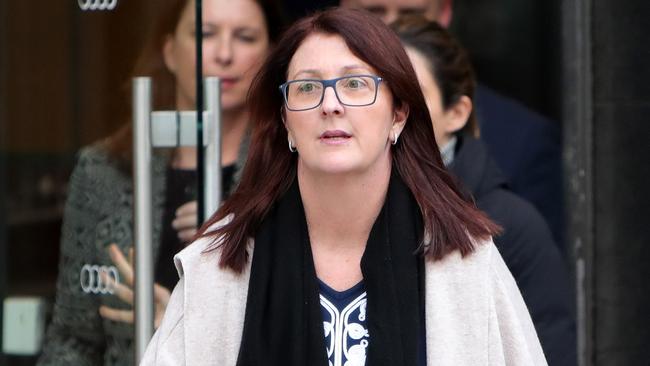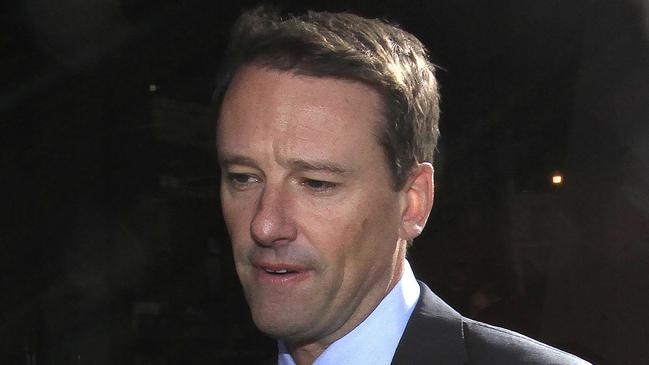Banking royal commission: NAB’s super arm charged deceased customers
Inquiry hears NAB’s super trustee charged dead customers, as the Commissioner raises the issue of criminal liability.

The banking royal commission has heard NAB’s super trustee NULIS had been deducting fees from accounts of people who had died.
This morning, counsel assisting Michael Hodge outlined instances where NULIS was deducting fees from accounts held by deceased people — identified as late as May this year, after round two of the royal commission hearings.
That was the round in which Commonwealth Bank revealed it had for years been taking fees from the dead.
It was not publicly known before Mr Hodge’s statements today that NULIS had engaged in a similar practice.
Separately, royal commissioner Kenneth Hayne has raised the prospect that National Australia Bank may have committed a crime by taking money from superannuation customers to which it was not entitled.
On the issue of criminal liability, Mr Hayne today asked NAB’s former superannuation executive Nicole Smith: “Did you think, yourself, that taking money to which there was no entitlement raised a question of the criminal law?”
Ms Smith responded: “No, I didn’t.”
However, she said NAB was still being investigated by the Australian Securities and Investments Commission over a scandal in which it charged fees to customers who received little or no service.
LIVE: Follow the events from the Royal Commission hearing in our blog
The royal commission has been examining why it took NAB so long — 10 months — to decide whether it should compensate customers for a breach where it charged fees for general advice services despite there being no financial adviser attached to a superannuation customer to provide those services.
Ms Smith admitted there was a conflict between the company’s wealth managers and the super trustees, which were battling over the need to compensate savers for fees charged where there was little or not benefit, the royal commission has heard.
NAB is in the witness stand for the third day running at the royal commission’s public probe into the $2.6 trillion superannuation industry, where it is facing questions over why it took so long to compensate customers who were charged the so-called “plan service fee” when there was no adviser to provide them the extremely basic services offered by the charge.
Despite finding the breach in 2015, it took NAB close to a year to decide it would be compensating customers who were wrongly charged the fees.
The bank eventually decided to pay more than 200,000 customers slugged with the charge close to $35m — but not until after, the commission has heard, attempts within its wealth management division to find a way to keep charging the fees.
According to Ms Smith, there was differing legal advice between NAB’s super trustee, which is responsible for acting in members’ best interests, and the fund “administrators”, who are the wealth management executives who work on a for-profit basis in the interests of shareholders. Ms Smith also revealed the trustee’s board was not included in important conversations regarding the potential compensation plans.
Ms Smith told the royal commission she had discussed the differing legal advice with NAB’s former wealth executive Paul Carter, who gave evidence at the hearings earlier in the week.
“I had some very high level conversations with Paul and the office of the trustee regarding the administrators different position to the trustees. My position was that you need to work through it and we need to come to a conclusion,” Ms Smith said. “I did not get into who was right and who was wrong. I was pushing the management team, who was the administrator, to come to a conclusion.”

Counsel assisting Michael Hodge, QC, raised the prospect that the reason behind the clash in legal opinion over whether the compensation should be paid or not, was because the “wealth division is the division that is the division that has to pay this money back”.
“That’s hopelessly conflicted isn’t it?” Mr Hodge asked.
Ms Smith answered: “Yes. There is a conflict for the administrator in terms of the revenue.”
She also agreed that NAB took too long to compensate customers.
“It was unclear from the reviews that were undertaken as to why the trustee had not been included in the board papers and made clear to the trustee that there were sets of unadvised members that the fee was being charged to,” Ms Smith told the royal commission.
NAB boss Andrew Thorburn was kept informed of efforts by employees to downplay the collection of fees from superannuation customers — to which the bank was not entitled — but it was seen as merely a disclosure problem, documents at the financial services royal commission have revealed.
The commission also heard yesterday of the lengths bank executives went to in an effort to keep charging the “plan service fee”, including describing access to its website as a valuable service.
NAB is facing the threat of more payouts, after its executives spent the past two days at the royal commission attempting to avoid putting the bank on the hook for tens or hundreds of millions of dollars more in compensation for the charging of a so-called adviser contribution fee.
Mr Carter this week claimed that even though the fee was called a fee it was actually a commission, which would spare the bank from having to refund customers who did not receive any service in return for paying the fee.
However Ms Smith has given evidence that while she also thought it was a commission it should have been stopped when Future of Financial Advice reforms outlawed new commissions in 2013.






To join the conversation, please log in. Don't have an account? Register
Join the conversation, you are commenting as Logout